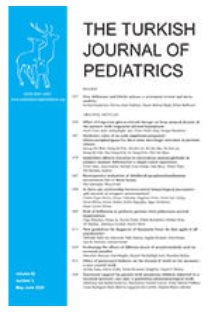Detection of allele frequencies of common c. 511C>T and c.625G>A variants in the ACADS gene in the Turkish population
___
1.Corydon MJ, Vockley J, Rinaldo P, et al. Role of common gene variations in the molecular pathogenesis of short-chain acyl-CoA dehydrogenase deficiency. Pediatr Res 2001; 49: 18-23.2.Tein I, Elpeleg O, Ben-Zeev B, et al. Short-chain acyl-CoA dehydrogenase gene mutation (c.319C>T) presents with clinical heterogeneity and is candidate founder mutation in individuals of Ashkenazi Jewish origin. Mol Genet Metab 2008; 93: 179-189.
3.Waisbren SE, Levy HL, Noble M, et al. Short-chain acyl-CoA dehydrogenase (SCAD) deficiency: an examination of the medical and neuro developmental characteristics of 14 cases identified through newborn screening or clinical symptoms. Mol Genet Metab 2008; 95: 39-45.
4.van Maldegem BT, Wanders RJ, Wijburg FA. Clinical aspects of short-chain acyl-CoA dehydrogenase deficiency. J Inherit Metab Dis 2010; 33: 507-511.
5.van Maldegem BT, Duran M, Wanders RJ, et al. Clinical, biochemical, and genetic heterogeneity in short-chain acyl-coenzyme A dehydrogenase deficiency. JAMA 2006; 296: 943-952.
6.Gallant NM, Leydiker K, Tang H, et al. Biochemical, molecular, and clinical characteristics of children with short chain acyl-CoA dehydrogenase deficiency detected by newborn screening in California. Mol Genet Metab 2012; 106: 55-61.
7.Pena L, Angle B, Burton B, Charrow J. Follow-up of patients with short-chain acyl-CoA dehydrogenase and isobutyryl-CoA dehydrogenase deficiencies identified through newborn screening: one center's experience. Genet Med 2012; 14: 342-347.
8.van Maldegem BT, Duran M, Wanders RJ, Waterham HR, Wijburg FA. Flavin adenine dinucleotide status and the effects of high-dose riboflavin treatment in short-chain acyl-CoA dehydrogenase deficiency. Pediatr Res 2010; 67: 304-308.
9.Tonin R, Caciotti A, Funghini S, et al. Clinical relevance of short-chain acyl-CoA dehydrogenase (SCAD) deficiency: exploring the role of new variants including the first SCAD-disease-causing allele carrying a synonymous mutation. BBA Clin 2016; 5: 114-119.
10.Jethva R, Bennett MJ, Vockley J. Short-chain acyl-coenzyme A dehydrogenase deficiency. Mol Genet Metab 2008; 95: 195-200.
11.Nochi Z, Olsen RKJ, Gregersen N. Short-chain acyl-CoA dehydrogenase deficiency: from gene to cell pathology and possible disease mechanisms. J Inherit Metab Dis 2017; 40: 641-655.
12.Dessein AF, Fontaine M, Joncquel-Chevalier Curt M, et al. Fluxomic evidence for impaired contribution of short-chain acyl-CoA dehydrogenaseto mitochondrial palmitate β-oxidation in symptomatic patients with ACADS gene susceptibility variants. Clin Chim Acta 2017; 471: 101-106.
13.Amendt BA, Greene C, Sweetman L, et al. Short-chain acyl-coenzyme A dehydrogenase deficiency. Clinical and biochemical studies in two patients. J Clin Invest 1987; 79: 1303-1309.
14.Naito E, Indo Y, Tanaka K. Identification of two variant short chain acyl-coenzyme a dehydrogenase allelees, each containing a different point mutation in a patient with short chain acyl-coenzyme a dehydrogenase deficiency. J Clin Invest 1990; 85: 1575-1582.
15.Bok LA, Vreken P, Wijburg FA, et al. Short-chain Acyl-CoA dehydrogenase deficiency: studies in a large family adding to the complexity of the disorder. Pediatrics 2003; 112: 1152-1155.
16.Kiykim E, Zeybek CA, Zubarioglu T, et al. Inherited metabolic disorders in Turkish patients with autism spectrum disorders. Autism Res 2016; 9: 217-223.
17.Okuyaz C, Ezgü FS, Biberoglu G, Zeviani M, Tiranti V, Yilgör E. Severe infantile hypotonia with ethylmalonic aciduria: case report. J Child Neurol 2008; 23: 703-705.
18.Kilic M, Senel S, Karaer K, Ceylaner S. Microcephaly and developmental delay caused by short-chain acyl-CoA dehydrogenase deficiency. Turk J Pediatr 2017; 59: 708-710.
19.Nagan N, Kruckeberg KE, Tauscher AL, Bailey KS, Rinaldo P, Matern D. The frequency of short-chain acyl-CoA dehydrogenase gene variants in the US population and correlation with the C(4)-acylcarnitine concentration in newborn blood spots. Mol Genet Metab 2003; 78: 239-246.
20.van Maldegem BT, Waterham HR, Duran M, et al. The 625G>A SCAD gene variant is common but not associated with increased C4-carnitine in newborn blood spots. J Inherit Metab Dis 2005; 28: 557-562.
21.Gregersen N, Winter VS, Corydon MJ, et al. Identification of four new mutations in the short-chain acyl-CoA dehydrogenase (SCAD) gene in two patients: one of the variant alleles, 511C-->T, is present at an unexpectedly high frequency in the general population, as was the case for 625G-->A, together conferring susceptibility to ethylmalonic aciduria. Hum Mol Genet 1998; 7: 619-627.
22.Pedersen CB, Kølvraa S, Kølvraa A, et al. The ACADS gene variation spectrum in 114 patients with short-chain acyl-CoA dehydrogenase (SCAD) deficiency is dominated by missense variations leading to protein misfolding at the cellular level. Hum Genet 2008; 124: 43-56.
23.Pedersen CB, Zolkipli Z, Vang S, et al. Antioxidant dysfunction: potential risk for neurotoxicity in ethylmalonic aciduria. J Inherit Metab Dis 2010; 33: 211-222.
24.Schmidt SP, Corydon TJ, Pedersen CB, Bross P, Gregersen N. Misfolding of short-chain acyl-CoA dehydrogenase leads to mitochondrial fission and oxidative stress. Mol Genet Metab 2010; 100: 155-162.
25.Amaral AU, Cecatto C, Busanello EN, et al. Ethylmalonic acid impairs brain mitochondrial succinate and malate transport. Mol Genet Metab 2012; 105: 84-90.
- ISSN: 0041-4301
- Yayın Aralığı: 6
- Başlangıç: 1958
- Yayıncı: Hacettepe Üniversitesi Çocuk Sağlığı Enstitüsü Müdürlüğü
A rare presentation of adrenal adenoma in infancy: isolated Cushing’s syndrome
Oğuzhan ŞAL, Gülçin YEĞEN, Pelin OĞUZKURT
Novel mutation and severe respiratory failure in congenital disorders of glycosylation Type Ix
Mustafa KILIÇ, Bekir ERGÜNER, Can KOŞUKÇU, Rıza Köksal ÖZGÜL
Cemil ÖZAL, Birgül BAYOĞLU, Sevilay KARAHAN, Kerem Mintaze GÜNEL, Fatma Banu ANLAR
Hande GAZATECİ TEKİN, Sabire Sanem YILMAZ, Hasan TEKGÜL, Sarenur GÖKBEN, Gül AKTAN
Güntülü ŞIK, Asuman DEMİRBUĞA, Agageldi ANNAYEV, Bahar TEMUR, Yavuz Selim AYDIN, Halil İbrahim DEMİR, Ersin EREK, Agop ÇITAK
FUAT KIZILAY, Turan Senem ÖZDEMİR, Burak TURNA, Nursen KARACA, Adnan ŞİMŞİR, Işık ALPER, Oktay NAZLI
Nezir ÖZGÜN, Leyla ÖZER, Ahmet YARAMIŞ
Cem PAKETÇİ, Pınar EDEM, Derya OKUR, Fatma Ceren SARIOĞLU, Handan GÜLERYÜZ, Erhan BAYRAM, Semra Hız KURUL, Uluç YİŞ
Children with extreme hyperferritinemia are at risk of receiving more chemotherapy than necessary
